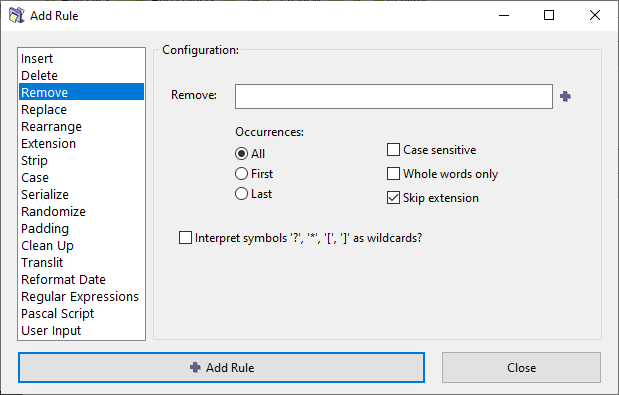Remove Rule
This rule removes the specified string from the file name. It has options to remove the first occurrence, the last occurrence, or all the occurrences of the specified string. You can enter multiple strings at a time (just separate them with "|"). If ReNamer finds any of them in the name, they will be removed. You can create a pattern with wildcards, so that any string that matches the pattern will be removed.
The parameters are as follows:
| Parameter
|
Details
|
| Remove
|
Enter the string to be removed.
- You can enter multiple strings at a time. Press the + button to separate two strings
- If the name does not contain the specified string, the rule will not act on it.
- If the name contains more than one of these strings, it will remove all of them.
TIP: Sometimes, the file names have a common string that needs to be removed. In such cases, rather than entering the whole string by hand, it is easier to borrow it from one of the file names. To do this, just click on a file name BEFORE launching the Remove rule. ReNamer will automatically copy the entire name of the selected file into the Remove field. Now edit this entry to get the desired common string.
|
 button button
|
Press to insert a separator between strings. You can also type a vertical bar (|) from the keyboard.
|
| Occurrences
|
In case the strings occure multiple times in the name, specify which occurrences should be removed. (Options are: first only, last only, or all)
|
| Skip extension
|
If this check box is selected, the rule won't touch the extention.
|
| Case sensitive
|
Will only remove a specified string from the name if the case matches exactly.
|
| Interpret symbols as wildcards
|
The following wildcards are allowed (compare with RegEx).
|
|
Represents
|
Example
|
| *
|
any number of characters (including numbers, space, underscores, etc.).
|
abc* equals abc followed by 0 or more characters.
|
| ?
|
Any single character (including numbers, space, underscores, etc.)
|
ab?d equals abcd, ab1d, ab d, ab_d, etc.
|
| []
|
Brackets enclose a set of characters, any one of which may match a single character at that position.
|
foo[ab]ar equals fooaar and foobar
|
| -
|
(only within a pair of brackets) denotes a range of characters.
|
foo[a-z]ar equals fooaar, foobar, foocar, foodar, etc.
|
|
